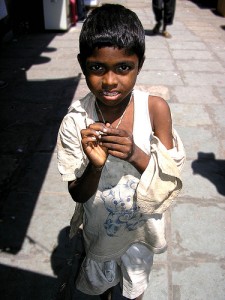by Sudha Nair
Stationed by the side of the street, Ramu’s tea stall was a cart on wheels set up with two jars of rusk, a stove, a kettle, a pan, some ginger, milk, sugar, glasses, and other paraphernalia for making ginger tea, Ramu’s isspecial cutting chai, as it was called. The cart also doubled up as Ramu’s bed for the night, when all the things on top were cleared and locked up in the wooden compartment below.
Ramu, a short and stocky man in his thirties, had come to the city a few years ago. From selling newspapers at traffic lights to selling vegetables door-to-door, Ramu had done several odd jobs in the city until one day a new business idea had struck him. He pawned his land in the village to buy a cart and other provisions and set up his tea business, which had been providing him with a steady income for the past three years. In the last three years, he had moved his ‘stall’ thrice, for reasons ranging from threats for higher hafta from local goons, to tougher competition, to the location being unprofitable for business. This time, with a choice spot near the railway station, and his business flourishing, he was hoping that he would never have to move again.
His new assistant, Deepu, was his sister’s son, a thin, nimble boy who possessed a cheerful disposition and a willingness to work all day long. Deepu’s job was to help with washing the glasses, refilling the water cans, delivering tea to nearby shops and offices, and manning the cash box for customers at the stall. Ramu’s sister had begged him to bring Deepu along to the city so that he could earn a living rather than whiling away his time with his friends in the village. With Deepu to help him, Ramu dreamt of expanding his business to serve colas, samosas, chewing gum, cigarettes, and more items to attract more customers. He still didn’t have a license but as long as he kept paying the local goons every week, he had nothing to fear. Last week, however, he had heard of an unexpected raid on street hawkers by a newly appointed police officer in the area, and he worried if he would have to move yet again.
But his biggest, most compelling concern was Deepu, whose attention was always getting distracted by the happenings on the street. Here was a curious boy who was taken by the sights of the city since the day he landed – the countless taxis, rickshaws and scooters in the city as they zoomed by, and the sight of red buses rumbling past had mesmerised him. Never before had he seen such crowded streets, and so many people thronging food stalls day and night. Months into working for his uncle, even as the tasks at the stall consumed his time all day, Ramu would often find him observing the happenings on the street.
Not only was Deepu a distracted helper, he also hardly paid any heed to Ramu’s warnings and would often run off to help people cross the street or lug their luggage onto the rickshaw. Once he rescued a stray pup that had tottered into the middle of the street and almost missed being hit by a car. Several times Ramu admonished him: “Learn the ways of the city. Here, it is every man for himself.” But it seemed that Deepu could never learn the ways of the city. At such times, Ramu worried if Deepu was more of a burden than an asset to his business.
That morning was like any other. The blind beggar woman sat at her usual place not very far from Ramu’s tea stall at the exit of the railway station, banging her metal begging bowl on the footpath, her palm outstretched for alms from passers-by.
Deepu was standing by the cash box when he noticed a tall man with a thick, striking moustache standing near the beggar woman. For a brief moment the man dug in his pocket for a coin and dropped it into her bowl, a white card slipping out of his pocket as he did so. Seemingly unaware of the loss, the man started to move towards the bike stand.
In a flash Deepu ran towards the beggar woman, picked up the card, and bolted after the man, who had started driving his bike away. Deepu raced behind it, waving his hands wildly and calling for the man to stop. “Saab, saab!” he kept calling out, but it was only at the traffic light that the man’s bike came to a halt. Breathless and puffing, Deepu reached the bike, and lunged at the man’s arm. Handing over the card to the man, he managed to say, “This fell from your pocket, saab.”
Rajat Singh recognised the card immediately. It contained the number of the tables and chairs supplier that he was supposed to call about a retirement party for one of the senior officials the following week. Having started only a week ago as a supervisor at the army officers’ canteen, he was overly eager to organise a splendid affair. As if to add to his hustle, one of the cooks at the canteen had quit, and he had to do find another soon. Rajat Singh was already late for work but he decided to drop Deepu back at his spot as a way of thanking him.
In the meantime, at the tea stall, Ramu hadn’t noticed Deepu rushing off and began to fear the worst after Deepu’s prolonged disappearance. Seeing Deepu arrive on a stranger’s bike, he ran towards him scolding.
It was however the stranger’s tall frame that loomed over him. “Is this your son?” he asked Ramu.
Ramu took in Rajat Singh’s menacing profile: the white, starched shirt; the khaki pants; the crisp, short haircut; and the thick, black, prominent moustache. Could he be a police officer? Ramu felt a slight pang of anxiety within him. “I’m a poor tea vendor, saab. He’s my sister’s son and new to the city, saab,”’ he stuttered, hands clasped and shaking, and head bowed, wondering if he was going to get into trouble.
“Do you cook?” Rajat Singh asked.
Ramu was puzzled by the question. “I’ve cooked ever since I was a little boy, saab,” he said. “But I only make tea here,” he added quickly.
Seeming satisfied with the answer, Rajat Singh left, leaving Ramu to wonder if there was any further reason to be worried about the encounter.
After dinner that night, Deepu had spread his rug and lay down on the cart, his chappals right on the cart beside his feet as usual from the fear of them being chewed up by street dogs.
Ramu straightened out his camp cot. Just as he was getting ready to outstretch his tired limbs and lie down, the sirens came shrieking. Jeeps with blaring lights came screeching down the street. Dozens of policemen jumped out of their jeeps, brandishing their canes, and started pelting all the unlicensed hawkers on the street, raining them with blows. Shrill whistles pierced the air. Street vendors panicked and fled to avoid the beating without a thought to their possessions. Ramu hurled Deepu out of the cart, and dragged him along as they ran into the dark night, leaving behind all that they owned. The street was emptied rather quickly with belongings scattered all over. It was all over in a matter of minutes.
Could the raid have been brought on by the chance encounter or was it a mere coincidence? Ramu did not know for certain. He had no desire to mull over his ruined business. He would send Deepu back to his village and strike it out on his own once again. Life on the street was tough, he knew. Here every man was for himself.
The next morning, Rajat Singh came to the spot near the railway station where he had seen the tea stall the previous day. He badly needed a replacement for a cook who had suddenly quit at the canteen, and his chance encounter with the tea-stall owner had made him wonder if that man might fit the bill. However, the stall had vanished. All that was left at the old spot was a broken camp cot and a few remnants of the cart; everything else was taken away to be sold by street urchins. No one knew where Ramu had gone.
Sudha, a mother of two, is constantly trying to pursue new avenues to push her creative boundaries. A chronic daydreamer, she is in awe of people who have followed their heart. Sudha is passionate about music, fitness, her family, and most recently, writing.
Pic : http://www.flickr.com/photos/amre/







Nicely done… Got an authentic feel to it. Especially like the way it ends.. Not the cliched happy ending.